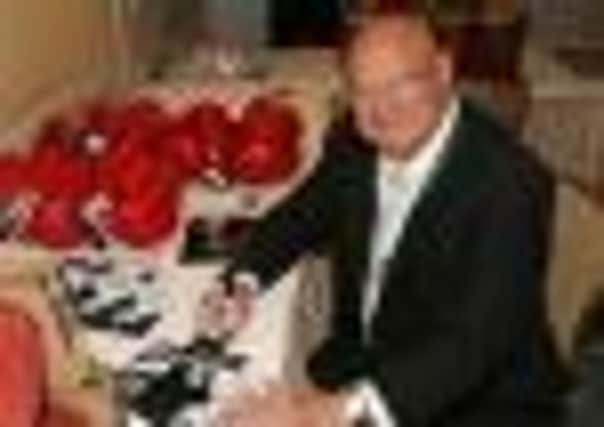Angelo Dundee: Genius in the corner who galvanised The Greatest


The genial Dundee who died at the age of 90 yesterday in Tampa, Florida, was best known for being in Ali’s corner for almost his entire career, but those in boxing also knew him as an ambassador for boxing and a figure of integrity in a sport that often lacked it.
He died with his family surrounding him, said son, Jimmy Dundee, but not before being able to attend Ali’s 70th birthday bash in Louisville, Kentucky, last month.
Advertisement
Hide AdAdvertisement
Hide Ad“It was the way he wanted to go,” Jimmy Dundee said. “He did everything he wanted to do.”


Jimmy Dundee said his father was hospitalised for a blood clot last week and was briefly in a rehabilitation facility before returning to his apartment. “He was coming along good yesterday and then he started to have breathing problems. My wife was with him at the time, thank God, and called and said he can’t breathe. We all got over there. All the grandkids were there. He didn’t want to go slowly,” the son said.
Dundee was credited with persuading Ali to continue in his third fight against Joe Frazier when Frazier was coming on strong in the “Thrilla in Manilla.”
Without Dundee, Ali may not have had the strength to come back and stop Frazier after the 14th round in what became an iconic fight. Dundee also worked the corner for Leonard, famously shouting “You’re blowing it son. You’re blowing it” when Leonard fell behind in his 1981 fight with Tommy “The Hitman” Hearns – a fight he would rally to win by knockout.
Dundee was also regarded as one of the sport’s great ambassadors. He was inducted into the International Boxing Hall of Fame in 1992 after a career that spanned six decades, training 15 world champions, including Leonard, George Foreman, Carmen Basilio and Jose Napoles. But he will always be linked to Ali as one of the most successful fighter-trainer relationships in boxing history, helping Ali become the first to win the heavyweight title three times. The pair would travel around the world for fights to such obscure places as Ali’s October 1974 bout in Zaire against Foreman dubbed “The Rumble in the Jungle,” and Ali’s third fight against Frazier in the Philippines.
“I just put the reflexes in the proper direction,” Dundee said in a 2005 interview.
After Ali returned from Rome with a gold medal at the 1960 Olympics, Dundee ran into him in the boxer’s hometown of Louisville, Kentucky, and invited him to come to Miami Beach to train. Ali declined. But that December, Dundee got a call from one of Ali’s handlers, seeking to hire Dundee. After Ali won his first pro fight, Dundee accepted.
He helped Ali claim the heavyweight title for the first time on 25 February 1964, when Sonny Liston quit on his stool after the sixth round during their fight in Miami Beach.
Advertisement
Hide AdAdvertisement
Hide AdIn an age of boxing when fighter-manager relationships rarely last, Dundee and Ali would never split.
When Cassius Clay angered white America by joining the Black Muslims and become Muhammad Ali, Dundee never wavered.
When Ali defied the draft at the height of the Vietnam war, losing three and a half years from the prime of his career, Dundee was there waiting for the heavyweight’s return. And when Ali would make bold predictions, Dundee never asked him to keep quiet.
“Through all those days of controversy, and the many that followed, Angelo never got involved,” Ali wrote in the foreword to Dundee’s book. “He let me be exactly who I wanted to be, and he was loyal. That is the reason I love Angelo.”
In the late 1970s, with Ali nearing retirement, Dundee jumped into the corner for an emerging star named Sugar Ray Leonard, who Dundee called “a smaller Ali.” Dundee trained Leonard for many of his biggest fights – including bouts against Wilfred Benitez, Roberto Duran and Thomas Hearns – and helped him become one of the most recognized welterweight champions in history.
Dundee teamed up with Foreman in 1994 to help him become the oldest heavyweight champion at 45 when he beat Michael Moorer. In one last bid to help a big fighter win a big fight, Dundee trained Oscar De La Hoya for his December 2008, fight with pound-for-pound king Manny Pacquiao. Dundee wasn’t in his corner on fight night, and perhaps the 35-year-old “Golden Boy” could have used him as he declined to answer the bell for the ninth round.
Always a slick strategist and fierce competitor, Dundee developed countless tricks to help his fighters win. If he thought a referee might stop a fight because of a gash on his fighter, Dundee would stand between boxer and referee, preventing the official getting a peek into the corner, and allowing him to conceal the wound before the bell. If a fighter was tired, Dundee would do anything he could to buy time, once untying a boxer’s shoes after every round only to slowly retie the laces each time.